Tom's briefly introduced in French & then the band immediately strikes up a boozy-bluesy beat as an unseen audience screams, in the black & white filmed concert of Tom Waits at Palace 1 (Tom Waits: Le Palace 1, 1981). It is frequently dated 1980, but was recorded March 1981 at t he top musical venue Le Palace in Paris, for T.F.1 Television, & circulated by bootleggers ever since.
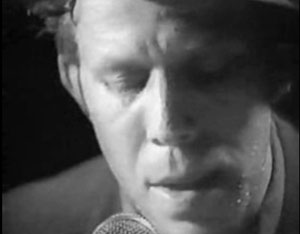 The camera pans through a neon sign that says "PALACE 1," then through the dark toward two spotlights like a pair of satellites. Into the light steps Tom Waits who seems to float in dark space with a microphone stand. The camera pans through a neon sign that says "PALACE 1," then through the dark toward two spotlights like a pair of satellites. Into the light steps Tom Waits who seems to float in dark space with a microphone stand.
Quite often it looks like Tom's alone on stage due to the lighting & the camera angles, but now & then we catch glimpses of Teddy Edwards on tenor sax, Ronnie Edwards at the organ, Greg Cohen on bass, & Harry Revane on drums.
The legendary Teddy Edwards (1924-2004) was one of the last great saxophonists of the bebop era. He gets special highlight closest to Tom in stage presentation. He & Tom were great friends, & Teddy would have Waits guesting on his own album Mississippi Lad (1991) after they toured together off & on throughout the 1980s.
Tom belts out "Heart Attack & Vine" breathing cigarette smoke on the microphone like a dragon roasting a knight. It's such a superb song, & he's almost a rocker singing it. He's as much a poet of body motion as of lyrics, & please god bring back the fedora as standard fashion to make all men sexy.
A stunning start to this concert film, with such a great song, sung with greatness, from a voice like the Boulders of God shaken in a marbles bag. His beautiful postures are those of a gaunt alchemist out of E. T. A. Hoffmann. The dark, dark, dark cinematography heightens the mood of Romanticist doomfulness.
He follows up "Heart Attack & Vine" with the equally brilliant "'Til the Money Runs Out," with such bad-neighborhood poetic lyrics as: "Check this strange beverage that falls out from the sky/ Splashing Bagdad on the Hudson in Panther Martin's eye/ He's high & outside wearing candy apple red/ Scarlet gave him twenty-seven stiches in his head..."
At Teddy's saxophone instrumental break, Tom saunters the stage in a cloud of smoke awfully amazing to have issued from one cigarette. I must say I'm glad he gave up smoking after he met Kathleen, as much for the sake of their kids as himself, but it still surprises me he could do it, after making cigarettes & gin so integral to his image & act for so many years.
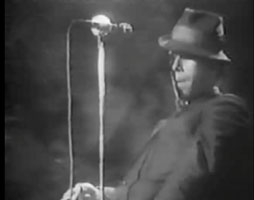 The impressive camera work captures such beautiful profiles of Tom's face, which embodies the kind of merchant-marine-beauty such as haunts the erotic dreams of any girl who rebelled against the fraudulant image of Prince Charming in favor of something vital, sensual, & real. The impressive camera work captures such beautiful profiles of Tom's face, which embodies the kind of merchant-marine-beauty such as haunts the erotic dreams of any girl who rebelled against the fraudulant image of Prince Charming in favor of something vital, sensual, & real.
As the audience claps & shouts, Tom takes a seat at the piano, grunts & groans, & begins a sweet melody on the keys.
He sings the ballad "Annie's Back in Town," which runs in part: "Well I know why you're drinking, I know your alibi/ So don't make up excuses, those are tears in your eyes/ And you're fallilng back in love again, now that Annie's back in town."
"Annie" sounds like several even better Waits numbers, & the sound-alike nature of some of his songs is something that he said began to bother him when he set out to build his Brawlers, Bawlers, & Bastards three-disc release, attempting to broaden his basics. But as for me, his blues & his ballads are the heart of Tom Waits, or that part of his creativity that most reaches heart, & I don't mind if he half-recycles a few melodies. To me any similarities just makes them more like chapters of a novel, or additions to a diary.
He follows through with scarcely a break, with one of his greatest of his great ballads, "I Wish I Was in New Orleans." It has is the tearful sound of haunted aching nostalgia: "Oh I wish I was in New Orleans/ I can see it in my dreams/ Arm in arm down Burgundy/ A bottle & my friends & me..."
Back on his feet, he saunters a bit, leans on the mic stand, scratches his hair, & begins to recite-sing his horror-tinged story-poem "Wrong Side of the Road" in full beatnik mode: "...Catch the tears off a window in a thimble made of glass/ Tell your mama & your papa they can kiss your ass/ Poison all the water in the winshing well/ And hang all them scarecrows from a sycamore tree...."
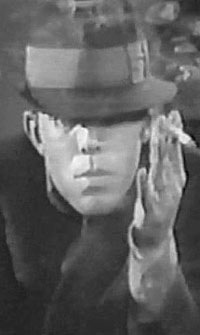 This is sung much more melodically on the studio recording, but in this rendition veers in & out of melody & poetry recitation. Toward the end of the number the audience is spontaneously clapping time, obviously & rightly in love. This is sung much more melodically on the studio recording, but in this rendition veers in & out of melody & poetry recitation. Toward the end of the number the audience is spontaneously clapping time, obviously & rightly in love.
He bows then takes up a guitar for a rendition of "Jersey Girls," another ballad of aching, aching romantic love. "But you know all my my dreams come true/ When I'm walking down the street with you/ Singing Sha na na, Sha la la la la la..."
In an interview Tom once said he never imagined he'd ever write "sha la la" into any lyric, but there it was. And how painfully beautiful he makes it. I suspect everyone has at one time or another known the pain imbedded in this song, & Tom is capturing something universal that is by no means restricted to New Jersey.
The curious reality is that it's about a relationship that seems to be succeding, & still it is full of downbeat sorrows, as if love at its best is only a dagger in the heart.
"Step Right Up" is his next piece, a barker's rap, a critique of commerce, incorporating every lame sales pitch ever concocted. "We neeed your business/ We're going out of business/ We're giving you the business/ Get on the business-end of our going-out-of-business sale/ Get our free brochure..." Makes me want to stick my elbows at my back & chicken-walk to town!
He works in a reprise of "Wrong Side of the Road" while introducing the bandmates he brought with him. Ah, sad, it's almost over! You can tell the audience just doesn't want him to go.
A Tom Waits forty-minute special for Danish television, Elephant Beer Blues (Sange efter lukkedid, 1976) has turned up at sundry video websites in its entirety, & a delightful look into Tom's early work it is. The copy apparently originates on an illegally distributed DVD pirated PAL VHS copy recorded off the air.
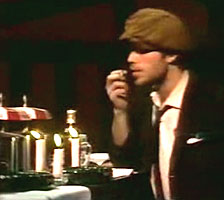 It is best known in English as Elephant Beer Blues because Tom is in a candlelit bar with a Carlsberg Elephant Beer strong lager & a cigarette, a pork pie hat & a loosened tie. The translation of the Dutch title, however, is Songs After Closing Time. It is best known in English as Elephant Beer Blues because Tom is in a candlelit bar with a Carlsberg Elephant Beer strong lager & a cigarette, a pork pie hat & a loosened tie. The translation of the Dutch title, however, is Songs After Closing Time.
Leaning on the bar, he starts off his sorrowful set of "blues & booze" tunes & narrations with his "Waltzing Matilda" also known as "Tom Traurbert's Blues" mimicking the ramblings of a drunk, telling us where that drunk has been, what he's done, into what winds he's been pissing.
A little joke, a little story, if drunks were really this preternaturally entertaining there'd be a peanut gallery for a sober audience in every tavern of the world.
He rambles & smokes for about nine minutes of storytelling, with a minimalist band just off screen. He then apologizes for having to leave but "I gotta go see a man about a dog" & saunters over to the band & begins a mini concert.
The band is a sax man, a slap base, a drum, & Tom sits down at the piano. Sounds like an audience of three or four clapping for him to start. Good lord I'd've loved to have been one of those three or four on the television studio's set that day.
After a couple piano licks it's obvious what he's about to sing: "Laughing at that old bloodshot moon in the burgundy sky," i.e., "New Coat of Paint." He follows up with the equally bluesy-thrilling number he defines as "a torch song written primarily for piano & fire extinguisher," namely, "Warm Beer, Cold Women." And notice that he's got a girlie-magazine sticking out of his jacket pocket.
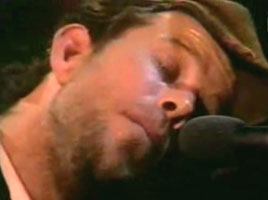 From within his drunken persona, he sings: "Warm beer, cold women, well I just don't fit in/ And every joint I stumbled in tonight, that's just how it's been/ All them double-knit strangers with gin & vermouth/ And all the recycled stories, receeding hairlines, in the Naugahyde booths..." From within his drunken persona, he sings: "Warm beer, cold women, well I just don't fit in/ And every joint I stumbled in tonight, that's just how it's been/ All them double-knit strangers with gin & vermouth/ And all the recycled stories, receeding hairlines, in the Naugahyde booths..."
Standing from the piano, Tom with his back to the audience quietly addresses the few band members as to what he's looking for, then takes to the microphone stand.
He growls at the mic a while, lights a bent cigarette, & begins the rapping half-sung half-talked "Emotional Weather Report," which runs in part:
"Since you left me baby. Since you left me baby/ Since you left me baby we been talking about late night & early morning low clouds/ With a chance of fog, & chance of showers into the afternoon/ With variable high cloudiness & gusty winds/ Gusty winds at times around the corner of Sunset & Alvarado," which places the tale in downtown Los Angeles, with other L.A. references to come.
It slowly becomes clear the song's about a drunken bum with no place to go as the temperature is dropping. "But I'm getting by, I'm getting along without you." It's powerfully a character-song even though not the equal of "Warm Beer, Cold Women" or his great "New Coat of Paint." Even average for Tom is better than anyone else.
Back at his piano with a "well ya know," he first talks about his buddy Chuck E. Weise, originally from Chicago, who bummed around a long time before reaching L.A. He tosses in a bit of praise for Carlsberg Elephant Beer while he's at it, taking a pull from the bottle, which has got to be one of the most successful product placements in entertainment history, & from a guy notorious for never endorsing products.
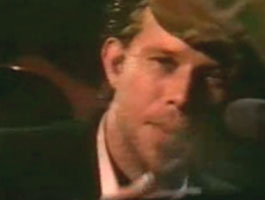 His tale of loneliness roles along with lyrics like "I ended up with a bad liver & a broken heart/ I drunk me a river ever since we been apart." The band stops playing & Tom just accompanies himself until near song's end. His tale of loneliness roles along with lyrics like "I ended up with a bad liver & a broken heart/ I drunk me a river ever since we been apart." The band stops playing & Tom just accompanies himself until near song's end.
Back on his feet, snapping his fingers to a jazzy beat & lead line from the sax, he begins another half-rap pure-poem number, "Bounced Checks," more or less celebrating being a tramp in the bad part of town.
He's slurring the lyrics, a little bit sexy, a whole lot demented, all about getting crushes on strippers, eating popcorn in the front row, or "walking down the street doing the don't really give a shit shuffle."
The dark, dark film noir lighting, Tom's face, Tom's piano, Tom's voice, you really can't ask more of a video taped performance. There are no pyrotechnics, just pure performance, & a flashback for me to see him as I first heard him in the '70s before he began experimenting with unusual instrumentation, way back when I was running about town telling people they had to listen to this guy.
Some of my chums agreed this was beyond genius. Others just couldn't relate. And one or two cynics ragged on me for bad taste & tried to tell me he's a fake. Of that I could never be convinced, not then, & still can't be now.
copyright © by Paghat the Ratgirl
|
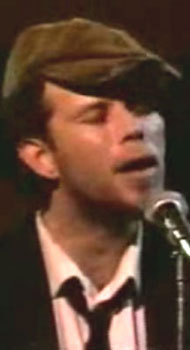
 The camera pans through a neon sign that says "PALACE 1," then through the dark toward two spotlights like a pair of satellites. Into the light steps Tom Waits who seems to float in dark space with a microphone stand.
The camera pans through a neon sign that says "PALACE 1," then through the dark toward two spotlights like a pair of satellites. Into the light steps Tom Waits who seems to float in dark space with a microphone stand. The impressive camera work captures such beautiful profiles of Tom's face, which embodies the kind of merchant-marine-beauty such as haunts the erotic dreams of any girl who rebelled against the fraudulant image of Prince Charming in favor of something vital, sensual, & real.
The impressive camera work captures such beautiful profiles of Tom's face, which embodies the kind of merchant-marine-beauty such as haunts the erotic dreams of any girl who rebelled against the fraudulant image of Prince Charming in favor of something vital, sensual, & real. This is sung much more melodically on the studio recording, but in this rendition veers in & out of melody & poetry recitation. Toward the end of the number the audience is spontaneously clapping time, obviously & rightly in love.
This is sung much more melodically on the studio recording, but in this rendition veers in & out of melody & poetry recitation. Toward the end of the number the audience is spontaneously clapping time, obviously & rightly in love. It is best known in English as Elephant Beer Blues because Tom is in a candlelit bar with a Carlsberg Elephant Beer strong lager & a cigarette, a pork pie hat & a loosened tie. The translation of the Dutch title, however, is Songs After Closing Time.
It is best known in English as Elephant Beer Blues because Tom is in a candlelit bar with a Carlsberg Elephant Beer strong lager & a cigarette, a pork pie hat & a loosened tie. The translation of the Dutch title, however, is Songs After Closing Time. From within his drunken persona, he sings: "Warm beer, cold women, well I just don't fit in/ And every joint I stumbled in tonight, that's just how it's been/ All them double-knit strangers with gin & vermouth/ And all the recycled stories, receeding hairlines, in the Naugahyde booths..."
From within his drunken persona, he sings: "Warm beer, cold women, well I just don't fit in/ And every joint I stumbled in tonight, that's just how it's been/ All them double-knit strangers with gin & vermouth/ And all the recycled stories, receeding hairlines, in the Naugahyde booths..." His tale of loneliness roles along with lyrics like "I ended up with a bad liver & a broken heart/ I drunk me a river ever since we been apart." The band stops playing & Tom just accompanies himself until near song's end.
His tale of loneliness roles along with lyrics like "I ended up with a bad liver & a broken heart/ I drunk me a river ever since we been apart." The band stops playing & Tom just accompanies himself until near song's end.